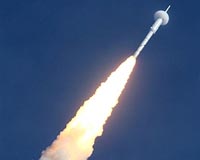 |
Sydney, Australia (SPX) Feb 02, 2010 It's clear by now that America's grand plans for returning astronauts to the Moon have been quashed, at least in the short term. The Constellation program, originally created to land astronauts there by 2020, is no more. But that doesn't mean that astronauts will not return in the future, nor does it mean that lunar exploration will cease in the meantime. NASA's Lunar Reconnaissance Orbiter is delivering wonderful images of the Moon, and uncovering new discoveries. Scientists as also still digesting the results of the LCROSS mission, which crashed a rocket stage near the Moon's south pole in 2009, and proved the existence of water there. NASA's Themis mission, a constellation of identical spacecraft previously launched to explore particles and fields in Earth orbit, has given rise to the Artemis mission. Two spacecraft from the Themis constellation have been sent to lunar orbit, to continue their mission there. NASA also expects to launch the LADEE orbiter, which will sample the Moon's tenuous atmosphere, and the twin GRAIL spacecraft, which will map the Moon's gravitational field, giving clues to the Moon's interior. There's also discussion of a proposed robotic lunar sample return mission, which would explore the Aitken Basin region, unvisited by any previous lander. Private companies are also working on commercial lunar missions, which would land scientific instruments on the Moon and deploy rovers. The Google Lunar X-Prize, which offers a huge cash reward to anyone who lands a private mission there, is being pursued actively by several teams. One team could launch as soon as 2011. All of these missions were in the works before 2010, but the recent review of NASA's plans suggests that there will be even more robotic activity. Plans have not been specific at this stage, but there seems to be a new impetus for more robotic landings on the Moon, and the testing of new technologies on these missions. These missions are designed to act as trailblazers for astronauts who will eventually follow in their wake, much like the Lunar Reconnaissance Orbiter is doing today. China expects to launch its second lunar orbiter later this year. This will carry a high-resolution camera, along with other instruments. India is planning its first robot lunar landing around 2012. China is expected to send its own first robot lander to the Moon in 2013. China will probably land a robot sample-return mission in 2017. India is also considering a sample-return mission, and Russia is planning an orbiter mission called Luna-Glob, which will fire penetrators into the lunar surface. Internationally, there has been talk of an International Lunar Network of small robot landers, although exact plans for the network are still in development. Some of these missions could yet experience delays or cancellations, but it's clear that the Moon will be a busy place for the rest of the decade. Dr Morris Jones is the author of "The New Moon Race", available from Rosenberg Publishing (www.rosenbergpub.com.au).
Share This Article With Planet Earth
Related Links LADEE orbiter Mars News and Information at MarsDaily.com Lunar Dreams and more
 Obama to propose abandoning US return to Moon: report
Obama to propose abandoning US return to Moon: reportWashington (AFP) Jan 29, 2010 President Barack Obama's 2011 budget, to be submitted to Congress Monday, will propose abandoning a program to return US astronauts to the Moon, two Florida newspapers said Thursday. Citing administration and NASA officials who spoke on the condition of anonymity, the reports said the White House would call on the US space agency to focus on other programs, including the development of comme ... read more |
|
| The content herein, unless otherwise known to be public domain, are Copyright 1995-2010 - SpaceDaily. AFP and UPI Wire Stories are copyright Agence France-Presse and United Press International. ESA Portal Reports are copyright European Space Agency. All NASA sourced material is public domain. Additional copyrights may apply in whole or part to other bona fide parties. Advertising does not imply endorsement,agreement or approval of any opinions, statements or information provided by SpaceDaily on any Web page published or hosted by SpaceDaily. Privacy Statement |